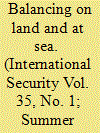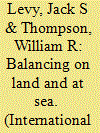| Srl | Item |
| 1 |
ID:
106959


|
|
|
|
|
| Publication |
2011.
|
| Summary/Abstract |
Save for the single issue of balance of power theory's relevance to the current system, where we and some of our critics are in real disagreement (and they are wrong), every aspect of this symposium has been highly productive. Our critics do not directly dispute the proposition that a rapid end of a single superpower world is extremely unlikely. They generally endorsed our core finding that the systemic constraints featured in IR scholarship are largely inoperative with respect to a United States that remains the sole superpower. These essays are consequently devoted mainly to discussing the implications of our findings and the future research agenda. In particular, they developed serious challenges to the idea of US led institutional revisionism, generated new ideas about both systemic and non-systemic constraints, and suggested potentially powerful theories about constraints on other states besides the United States.
|
|
|
|
|
|
|
|
|
|
|
|
|
|
|
|
| 2 |
ID:
097752


|
|
|
|
|
| Summary/Abstract |
Scholars often interpret balance of power theory to imply that great powers almost always balance against the leading power in the system, and they conclude that the absence of a counterbalancing coalition against the historically unprecedented power of the United States after the end of the Cold War is a puzzle for balance of power theory. They are wrong on both counts. Balance of power theory is not universally applicable. Its core propositions about balancing strategies and the absence of sustained hegemonies apply to the European system and perhaps to some other autonomous continental systems but not to the global maritime system. Sea powers are more interested in access to markets than in territorial aggrandizement against other great powers. Consequently, patterns of coalition formation have been different in the European system and in the global maritime system during the last five centuries. An empirical analysis demonstrates that counterhegemonic balancing is frequent in Europe but much less frequent in the global system. Higher concentrations of power in the global system lead to fewer and smaller rather than more frequent and larger balancing coalitions, as well as to more frequent and larger alliances with the leading sea power than against it.
|
|
|
|
|
|
|
|
|
|
|
|
|
|
|
|
| 3 |
ID:
097753


|
|
|
|
|
| Publication |
2010.
|
| Summary/Abstract |
Scholars often interpret balance of power theory to imply that great powers almost always balance against the leading power in the system, and they conclude that the absence of a counterbalancing coalition against the historically unprecedented power of the United States after the end of the Cold War is a puzzle for balance of power theory. They are wrong on both counts. Balance of power theory is not universally applicable. Its core propositions about balancing strategies and the absence of sustained hegemonies apply to the European system and perhaps to some other autonomous continental systems but not to the global maritime system. Sea powers are more interested in access to markets than in territorial aggrandizement against other great powers. Consequently, patterns of coalition formation have been different in the European system and in the global maritime system during the last five centuries. An empirical analysis demonstrates that counterhegemonic balancing is frequent in Europe but much less frequent in the global system. Higher concentrations of power in the global system lead to fewer and smaller rather than more frequent and larger balancing coalitions, as well as to more frequent and larger alliances with the leading sea power than against it.
|
|
|
|
|
|
|
|
|
|
|
|
|
|
|
|